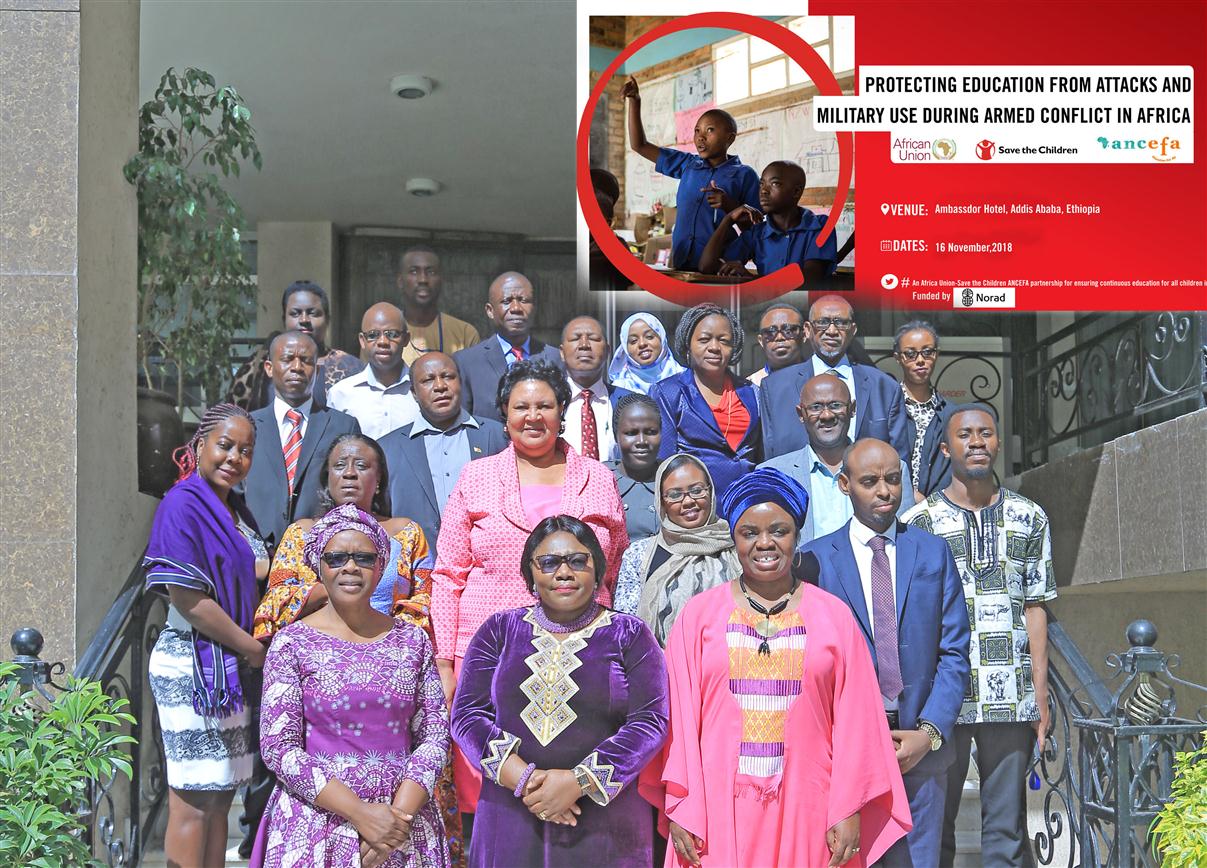Delegates from eleven (11) African countries attended the Continental Education Strategy for Africa (CESA) Peace and Education Cluster workshop on Ensuring Safe Schools, which was held at the Ambassador Hotel Addis Ababa on 16th November, 2018. This workshop was co-hosted by the African Union Commission (AUC), Save the Children International and the Africa Network Campaign on Education for All (ANCEFA). The event was opened by H.E Prof. Sarah Anyang Agbor, Commissioner for Human Resources, Science and Technology of the African Union Commission and Ms. Doris Mpoumou, Director of the Save the Children AU Liaison Office. Among the participants were government officials representing respectively, the Ministry of Education and Ministry of Defense. Participants were from State and non-State agencies from Djibouti, Ghana, Kenya, Malawi, Sierra Leone, Somalia, South Sudan, Sudan, Tanzania, Uganda and Zimbabwe.
The overall objective of the workshop was to improve contextual understanding of making schools safe in emergencies in targeted countries, and to improve mutual understanding among governments and education stakeholders on engagements in making schools safe at country and regional levels. To achieve this overall objective, participants worked in groups and:
- Identified emergency and other major issues affecting children’s education in Africa;
- Examined existing education platforms and forums across all levels to address institutional weakness in ensuring protection of education under all circumstances;
- Shared experiences on issues and lessons learnt in the engagements by countries on context-specific safe schools advocacy;
- Examined current and proposed other interventions for protecting education at the local, national, regional and continental levels.
Through group and plenary discussions, the participants noted that Africa faces significant challenges in ensuring that all children access quality education unhindered and protected from avoidable and other difficulties that compromise school safety. It was agreed that this is attributed to the inadequacy of existing education platforms at community, national and continental levels for addressing the challenges which are multi-sectoral and multi-dimensional in nature.
The participants agreed that all relevant stakeholders including state and non-state actors should be involved in the implementation of the following:
- Enhance awareness of the imperative to protect education and ensure safe schools as articulated in the Safe Schools Declaration and other continental and global instruments on the matter
- Establish inter-ministerial committees at national level to lead the implementation of safe schools guidelines and related provisions
- Explore mechanisms for ensuring access of refugee children to quality inclusive and timely education, taking into consideration the range of challenges such as language, differing education systems, adequacy of infrastructure and financing
- Develop platforms for community engagement in the identification of school safety needs and policy review to deal with education in emergency situations
- Develop mechanisms for building resilience in coping with emergencies affecting education, including robust early warning systems
- Explore the use of modern technologies for building safe schools and sustainable campuses
- Develop and implement capacity building interventions based on expressed needs of Member States and their implementing agencies
- Invite all key stakeholders to participate in the Peace and education Cluster and the promotion of Safe schools, including Regional Economic Communities, Member State institutions, Civil Society and International agencies
Participants requested that the communique be presented to relevant statutory meetings of policy makers for consideration and further action
This 16th day of November, 2018
Addis Ababa

